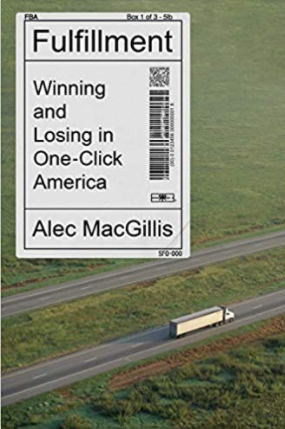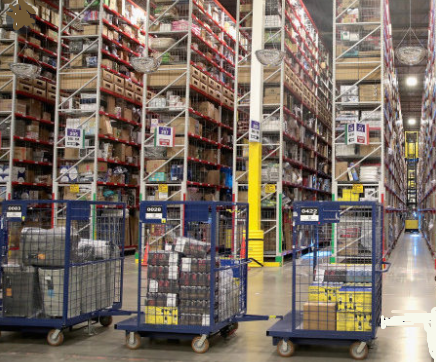
Geography of Inequality from Seattle to Baltimore – Winner and loser cities




Alec MacGillis’s Fulfillment: Winning and losing in one-click America, highlights with empathy and breadth, what drives economic populism and the division between a sliver of the professional-managerial elite in winner-takes-all cities and everyone else, also the hidden human costs of other inequality not the growing gap between the rich and poor, but the gap between the country’s winning and losing regions, resulting in an intimate account of contemporary capitalism and its drive to innovate, its dark, pitiless magic, its remaking of new America with every click. Amazon’s sprawling network of delivery hubs, data centers, and corporate campuses epitomizes a land where winner and loser cities and regions are drifting steadily apart, the civil fabric is unraveling and work has become increasingly rudimentary and isolated. Amazon contributes to the inequality by paying salaries so low that more than 4, 000 warehouse workers in nine states are eligible for federal food-stamp hand out subsidies. The growing inequality between regions reflects not only rural decline but also languishing cities.
In 1937, Upton Sinclair published a novel called A Story of Ford-America and blasted the callousness of a company worth “a billion dollars” that underpaid its workers while forcing them to engage in repetitive and sometimes dangerous assembly line labour.
Eighty-three years later the market capitalisation of Amazon.com has exceeded one trillion dollars, while the value of the Fort Motor Company hovers around thirty billion. We have entered the age of one-click America – and as the coronavirus makes Americans more dependent on online shopping its sway will only intensify..
In 1980, most US regions had median incomes within 20 per cent of the national average, but by 2013, thin blue-line areas had incomes more than 20 per cent above the average, which left behind regions that had their income below 20 per cent national average.
In the 1960s, twenty-five cities with the highest median incomes including Milwaukee. Wisconsin and Des Moines, but today nearly all the richest cities are on the coasts.
MacGillis charts how declining cities incubate rage and points out how readily this is channelled into racism, with added rising resentment making voters susceptible to racist and nativist appeals from opportunistic candidates and cynical TV networks.
“Economic decline did not excuse racism or Xenophobia -rather, it weaponized it”.
Amazon is following the ground prepared by Walmart in the 1980s and 90s compounded by the rise of the internet and accelerated to warp speed by the pandemic, driving many small and medium-sized regional businesses, leaving wastelands bereft of local institutions and established path of economic opportunity.
In Seattle, high-paid workers in new office towers displace a historic black neighbourhood. In suburban Virginia, homeowners try to protect their neighbourhood from the environmental impact of a new data centre. Meanwhile, in El Paso, small office supply firms seek to whether Amazon’s takeover of government procurement and in Baltimore, a warehouse supplants a fabled steel plant.
Fulfillment also reveals how Amazon has become a force in Washington D.C. ushering readers through a revolving door for lobbiysts and government contractors and into ECO Jeff Bezo’s lavish Kalorama mansion.
Famed writer and activist Upton Sinclair published a novel titled “ A Story of Ford-America” in 1937, where he blasted the callousness of a company worth “a billion dollars” that underpaid its workers while forcing them to engage in repetitive and sometimes dangerous assembly line labour.
Eighty years later, the market capitalization of Amazon.com has exceeded one trillion dollars, while the value of the Ford Motor Company hovers around thirty billion. We have entered the age of one-click America- and as the coronavirus makes Americans more dependent on online shopping its sway will only intensify.
Early 20th century, the vast Sparrows Point Steelworks outside Baltimore paid poverty wages and had its own trolley car to carry dead workers to the cemeteries. But in the 1930s the union made a concerted effort to organise, owner Bethlehem Steel fought back hard saying “ outsiders have not been necessary for the past, nothing happened to make them necessary now”, included in the company manifesto. Today Amazon Warehouse stands where the steelworks once stood. The online retail giant, like Bethlehem Steel before it, finds itself trying to fend off unions. An unionisation vote at an Amazon warehouse in Alabama has become the most important fight for the American labour movement in decades.
Amazon’s recent website warning staff that with a union involved, it “ won’t be easy to be as helpful and social with each other”.
Alec MacGillis uses the e-commerce group as a lens through which to examine the geography of inequality, from booming cities like Seattle to ailing ones such as Baltimore.
Alec MacGillis’s literary investigation of America, with empathy and breadth, hidden human costs of the other inequality – not just the growing gap between rich and poor, but the gap between the country’s winning and losing regions, that falls within that company’s growing shadow and shows Amazon’s sprawling network of delivery hubs, data centers, and corporate campuses epitomizes a land where winner and loser cities and regions are drifting steadily apart, the civic fabric is unraveling, and work has become increasingly rudimentary and isolated.
In Seattle, high-paid workers in new office towers displace a historic black neighbourhood in suburban Virginia, homeowners try to protect their neighbourhood from the environmental impact of a new data centre. Meanwhile, in El Paso, small office supply firms seek to whether Amazon’s takeover of government procurement and in Baltimore, a warehouse supplants a fabled steel plant. Fulfillment reveals how Amazon has become a force in Washington, D.C., ushering readers through a revolving door to lobbyists and government contractors and into CEO Jeff Bezo’s lavish Kalorama mansion.
“As Amazon has grown before our eyes, so did those fissures that it had been helping to create all along”.
The pandemic has swelled Amazon’s profits and lengthened its shadow still further, while also fuelling a backlash from employees who feel they have been pushed too far.
MacGillis reveals the story of Bill Bodani, who worked at Sparrows point after unionisation brought higher wages and better conditions – only to return to the exact same spot to work for Amazon, for less than half the pay, in a job where he didn’t always have time to the bathroom. He had lived for months in his basement for the feat of catching Covid-19 at work and passing it on to his family.
“For several decades, they had enjoyed the benefits of work that was better paying and safer than what had come before, and that had brought with it the dignity of being able to support one’s family in a middle-class existence. And now things had circled back to where they had begun”.
Another interviewee demolishes unwanted houses in Baltimore and sells the bricks to the developers of staggeringly expensive studio flats in Washington. “ The great paradox galloped onward: the spread of blight and abandonment in one city, the spread of congestion and exclusion in another only an hour away. One city rushing to demolish three-storey row houses that would cost $1m in the other down the road”, MacGillis writes.
Amazon’s relationship to politics and power and MacGillis takes the reader inside the anonymous rooms where officials quietly agree to tax incentives for Amazon to build warehouses. He recollects the spectacle that ensued when Amazon announced it was looking to open a second headquarters, deliberately sparking a desperate battle between cities to woo it ( one Atlanta suburb even offered rename itself “ Amazon”).
He reveals the links between the Democratic party and the tech industry, and the uncomfortable fact for Joe Biden that his voters span both “ upper-middle-class consumers and the people who packed and delivered things to them”,
He writes about a woman trying to calm her children in a homeless shelter in Ohio straight into a ballroom in Washington to specifically focus on the inequality. MacGillis’s illuminating reported portrait not of a company, but of the country it has helped to reshape and an intimate account of contemporary capitalism and its drive to innovate, its dark, pitiless magic, its remaking of America in every click, with the one-click nation.
Fulfillment: Winning and Losing in one-click America by Alec Macgillis, Farrar, Stratus & Giroux £28, 400 pages.
